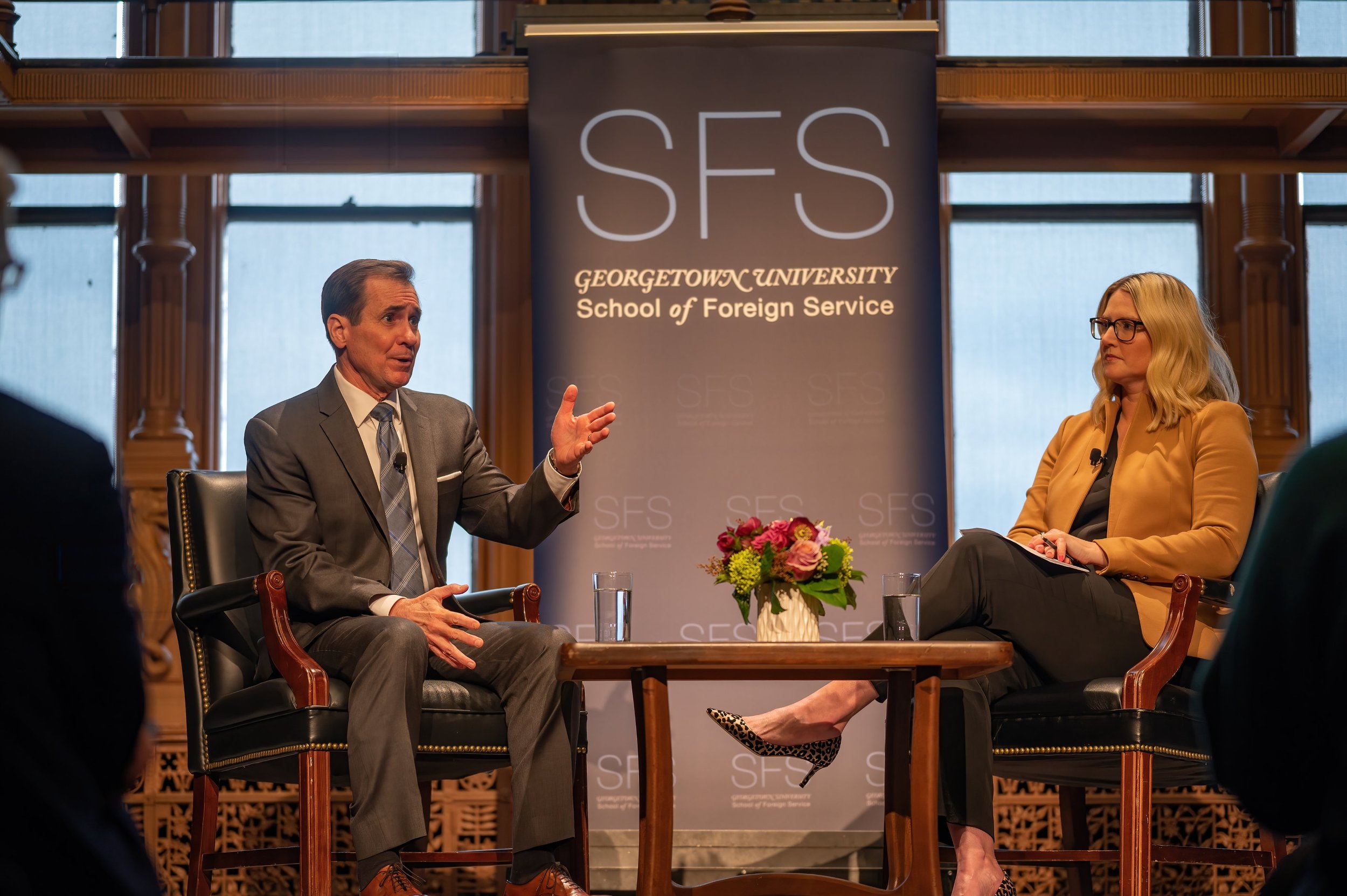NSC Spokesman John Kirby Visits Georgetown
Photo via Georgetown SFS
ANDREW WONG: On February 16, National Security Council Coordinator for Strategic Communications John Kirby came to Georgetown to speak to students regarding the one-year anniversary of Russia’s invasion of Ukraine. As the top NSC spokesman for the last year, Kirby has been central in keeping the media and American people informed about the Biden Administration’s policy regarding the war and sharing America’s resolve to support the Ukrainian people in their fight against Russia’s invasion. In attendance at the event were dozens of eager SFS and MSFS students, members of the media, and Georgetown students originally from Ukraine.
Speaking in a packed Riggs Library, Kirby launched into the event praising the Ukrainian people for their resolve against Russia, noting how he “respects and remains awed of the Ukrainian people, both in uniform and not”. He commended Ukrainian President Volodomyr Zelensky for his steadfast, yet humble leadership throughout all the hardship. Moreover, he spoke at length about the West’s resolve to support Ukraine with intelligence, training, and armaments, vowing that the US would stay in the fight for “as long as it takes”. But with the threat of a possible Russian offensive coming this spring, he also discussed the need for the American public to remain supportive of Ukraine and warned of “war fatigue” taking root in the US.
Nonetheless, Kirby remained optimistic for the future. He discussed the Russian failure to achieve victory, and the Russian military’s struggles in the field, humorously quipping “Mr. Putin changes generals the way I change socks!”
When asked about career advice for students interested in the field of communications, Kirby talked at length about how our world is a “post-audience world”, where news is communicated around the world instantaneously, and audiences only care for 15-second sound bites. In this digital, “zoomer” world, Kirby emphasized the importance of slowing down as a communicator and ensuring that one has control over a situation before even beginning to communicate. He offered the example of how during the early months of the Biden Administration, one of his biggest tests as NSC spokeman was responding to the media after 13 US Marines were killed in action by a suicide bomb at the gates of Hamid Karzai Airport in Kabul during the US withdrawal from Afghanistan. Immediately upon receiving the news of the tragedy, Kirby called a lid on all information coming out of the NSC and waited until the afternoon to publish a statement – thus ensuring he had all the proper information and also preventing misinformation regarding the fast-moving development from spreading.
Kirby closed by offering his views on the future. He believes that the war in Ukraine will eventually end. He also discussed the specter of conflict with China at length, with the news of the flight of a Chinese surveillance balloon over North America fresh in everyone’s minds, Kirby assuaged fears by stating that though the “US and China are locked in strategic competition, we do not seek conflict with the PRC''. He remarked that careful communication and delicate diplomacy should be able to keep the peace with the PRC.
Finally, Kirby ended with a bit of life advice for students, discussing the pitfalls of having one’s career all planned out. “I chose which office of the Navy to join by spinning a tongue depressor pinned to a paper plate with segments marked by names of departments,” he remarked. Imploring students to let go of their 5-year and 10-year career plans and let go of their anxieties for the future, he ended with a humorous review of his unorthodox career choice strategy. “Me and my buddy joined the Department of Public Affairs, because that’s what the spinning stick landed on… It got me here to where I am today!”
Andrew Wong is a columnist for On The Record. He is a freshman in the School of Foreign Service studying International Politics. In his free time, he enjoys swimming, hiking, and catching up on New Jersey politics.

